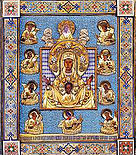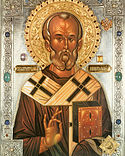There are many citations on the website Internet-Sobor from the Holy Fathers in judgment of your schism.
Division of any kind in the Church, regardless on what level it occurs, is a tragedy, though not all such divisions can be considered schisms as understood by the canons and the Holy Fathers.
Those who speak of the current divisions in the church and label it a schism are consciously or subconsciously subverting the concept. Schism is when unity with the universal Church is violated. Those who call us schismatic show that they believe that the Odessa synod is the Russian local Church, but such a belief is absurd. From its very founding, the ROCA considered itself only a part of the Russian Church. When the ROCA joined with the Moscow Patriarchia in 2007, those who did not agree with the decision, found themselves divided into many administrative church bodies, commonly called “fragments.” So, the Odessa synod is not the entirety of the Russian Church, but only a “fragment” of its part.
The danger of schism is that it is a separation from the universal Church. If separation from the synod in Odessa is a separation from the universal Church, then it follows that all who are not in communion with the synod in Odessa find themselves outside the Church. Yet, the Metropolitan Agafangel himself never held such beliefs. On the contrary, in his writings and actions he recognized the relative canonicity of the other “fragments.” (The canonicity of all the present “fragments,” including the Odessa synod, can be questioned to some degree.) For example, Metropolitan Agafangel accepted Bishops Dionisiy, Iriney and Anastasiy, who were consecrated by other “fragments,” in their existing office without cheirothesia.
In this way, separation from the synod of Metropolitan Agafangel is not a departure from the Church, i.e. schism, and applying “fearful” citations from the Holy Fathers to our circumstances is an intentional or unintentional deception.

